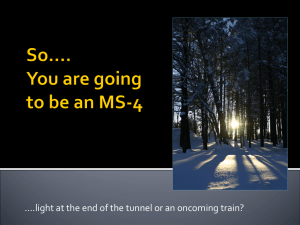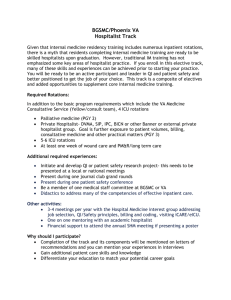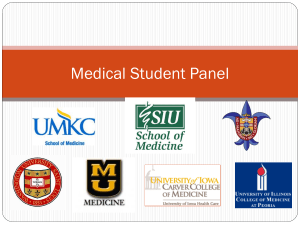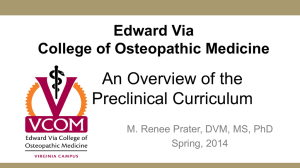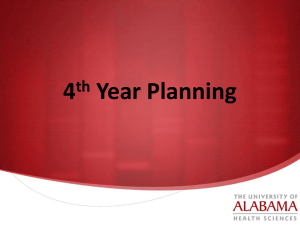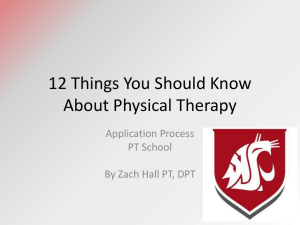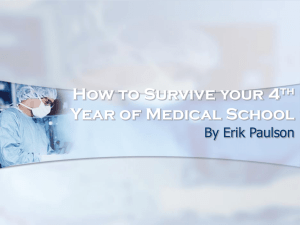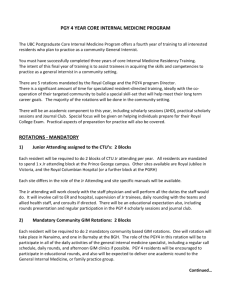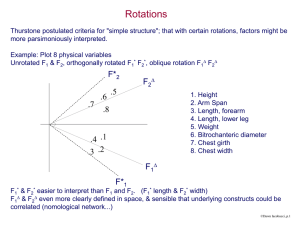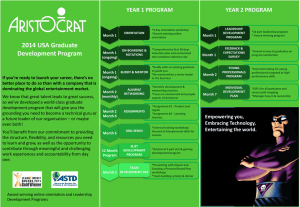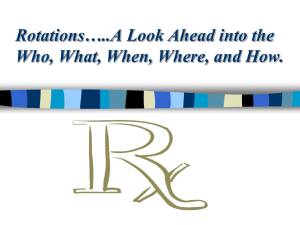MS4 scheduling
advertisement
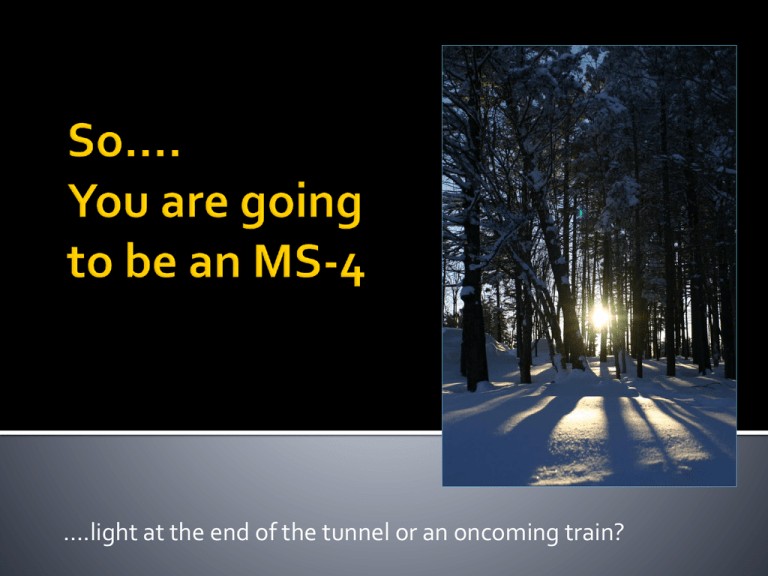
….light at the end of the tunnel or an oncoming train? What do you want to do with your life? RULE #1 – Don’t freak if you don’t know, work hard RULE #2 – If you do know, still work hard RULE #3 – Work on developing the knowledge and skills you’ll need to be a great doc RULE #4 – BE HONEST WITH YOURSELF Are you interested in the common patient complaints? Are there patients you really don’t like dealing with? Are there patients you would be miserable not seeing? Lifestyle choices? Practice choices? Your colleagues Geography Try to see as many patients as you can third year If you are really unsure – talk to some fourth years and talk to faculty Back to RULE #1 – Do NOT freak out. Fourth year will be different for EVERY single person Four parts: The Tests Things required for MUSOM Things required for your residency goals Things required by/for you (aka FUN) By July 1, 2011 ACLS: Two sessions offered by MUSOM By December 31, 2011 Step 2 CK: Essentially just like Step 1, only generally considered “easier” and 1 block of questions longer Step 2 CS: 12 patient OSCE that you have to travel for, pay lots of $$ for, but not study much for By April 1, 2012 MUSOM Radiology Exam: On-line 100 question exam 4 weeks of IM at the VA 4 weeks of Emergency Med at CHH 4 weeks of Surgery (1 wk anesthesia + 3 wks of subspecialty) Plus…22 weeks of electives/away rotations/rural if you need it The things for your residency goals & for FUN Away rotations Extra rotations in your field or subspecialties Stuff you may never see again International or Wilderness electives Time off for interviews/vacation/having babies http://musom.marshall.edu/students/senior-handbook/ Listing, description & contact info for all the fourth year electives Check them out BEFORE the scheduling meeting so you have an idea what is out there What do you want to do? ▪ Do we have an academic department? ▪ Is it a highly competitive specialty? ▪ Do you want to go to a highly competitive area/specific program? How strong of a candidate are you? ▪ Do you need to take Step 2 early? ▪ Do you need to apply to more than one specialty? ▪ Will you need to do a lot of interviews? As for the answers… http://www.nrmp.org/ - then go to the “Data & Reports” section, then entire 281 page PDF is there for all specialties Help you honestly gage your chances as an applicant in your chosen field Guide for away rotations, where to apply, personal statement Letter of recommendation (you’ll need at least 3). If you don’t have one – find one! Join the American College of Whatever Specialty, some have virtual mentors Current MS-4s Access to faculty is a MUSOM strength – use it! Iserson’s Getting into a Residency (library or purchase) When to take Step 2 CK? When to take Step 2 CS? Away Rotations: Yes or No? Interview Season Scheduling? Your Residency Candidacy If step 1 low: need a boost, take early If step 1 high: maybe consider late, but earlier usually better Preparation Have you struggled on mini-boards? Do you know you need extra study time? Timing Have to sit by end of December – but fit around away rotations, required rotations, interviews, etc. Takes 3-wks to score, if going for the “boost” try to take by the end of Sept at the latest so score will be in by Nov 1st Time & Resources MUCH more varied than Step 1 (1-6 wks) Kaplan/USMLE World QBANK (Both are pretty good) Step 2 Review Course – Pretty Good, 2 weeks, mostly half days First Aid Step 2 – unlike Step 1 this is only ok not the best Step Up to Medicine – Great, but long and detailed Secrets – Very popular – detailed Crush Step 2 – Very Popular – very general Main Focus of test: Internal Medicine – As pathology was to Step 1 OB/GYN & Pediatrics – MUSOM typically perform well here Surgery (subspecialties) – Use Qbank for review *Neurology/Biostats – Fill in your knowledge gaps, biostats VERY high yield Psychiatry – First Aid for Psychiatry is great Travel: Houston, Chicago, Philly, Atlanta or Los Angeles (Philly hardest to schedule) Does NOT require a lot of preparation, no advantage to waiting Realize it is administered directly by the USMLE not Prometric First Aid for CS is all you’ll need. Review it the couple of days before your test Squish it in whenever is it convenient given the travel. Schedule ASAP (you can change it relatively easily if you have enough advance notice) You should definitely consider if: MUSOM does not have an academic department You want to go to a… specific program specific city extremely competitive residency or place Everyone: just to see a different way of doing things Visiting Student Application Service (VSAS) http://www.aamc.org/programs/vsas/ Other Institutions – check their websites Most are 4 weeks Rotations are usually subspecialties Highest yield for resident exposure Define what’s most important: what or when Apply to 2-3 for the same month Personal contact/connections Frustrating how slow schools are with getting back to you Respond promptly Programs/schools are grouped into somewhat arbitrary tiers – there is no “10-best” list Ask Faculty in the field Expect some Bias See Linda Holmes for list of graduates in a specialty Ask MS-4s going into that specialty Freida (on the AMA site) Specialty Training Statistics StudentDoctor.net http://forums.studentdoctor.net/ US News Best Hospitals http://health.usnews.com/sections/health/best-hospitals Cannot miss any days of your anesthesia week Check with away rotations on interview policy BEFORE committing “Flexible” electives (academic medicine, medical spanish, readings in international/rural health, medical education) October November December January +++++++++++ Anesthesia ------------------ -------+++++++ +++++++++ Derm ------------------ ------------------ ++++++++++ ++++++++++ ER ------------------ -------+++++++ +++++++++ +++++++++++ -------------++ ++++++++++ +++++++++ +++++---------- Gen Surg ------------------ ++++++++ +++++++++ ++++------------ Internal -------------+++ ++++++++ +++++++++ ++++------------ Neuro Surg ------------------ ++++++++++ ++++++++ ++++--------- ObGyn -------------+++ ++++++++ +++++++++ ++++------------ Ortho ------------------ ------------------ +++++++++++ ++++++++ Family Peds -------------++ +++++++++ +++++++++ +++++---------- Rads ------------------ ++++++++++ ++++++++ ++++++++ Required rotations: July/August if that is your field Christmas and NYE if live nearby Strategically schedule interviews Away rotations: Earlier than later, be wary of interview season Interviews: Clump together geographically Preference will be given to the first three months of your schedule Required/away/elective/step 2 Required/sub-I/away Away/away/step 2/elective Away/away/away, etc You can trade required times with your classmates $$ is a issue for interviews & aways – you do NOT get much school loan money Credit cards, parents, residency & relocation loans Start planning/thinking about things NOW (but not to the detriment of your rotations!) You should start working on your application in LATE spring – it will take WEEKS to finish it (due Sept 1st) Personal Statement Letters of Recommendation (Ask early!) Compiling all of your extracurricular activities Research Community service Leadership/Awards Hobbies (be VERY honest here – you will get a lot of interview questions!) Things more complicated if you do Ophtho, Peds Neuro, Urology, Military …in mid-march (shortly after Match Day) The dirty details of the Applications (ERAS) Interviewing 101 The Matches & Ranking (NRMP) Small-group discussions with freshly matched MS-4s and current residents http://musom.marshall.edu/students/senior-handbook/ http://www.nrmp.org/ http://www.aamc.org/programs/vsas/ http://forums.studentdoctor.net/ http://health.usnews.com/sections/health/best-hospitals
